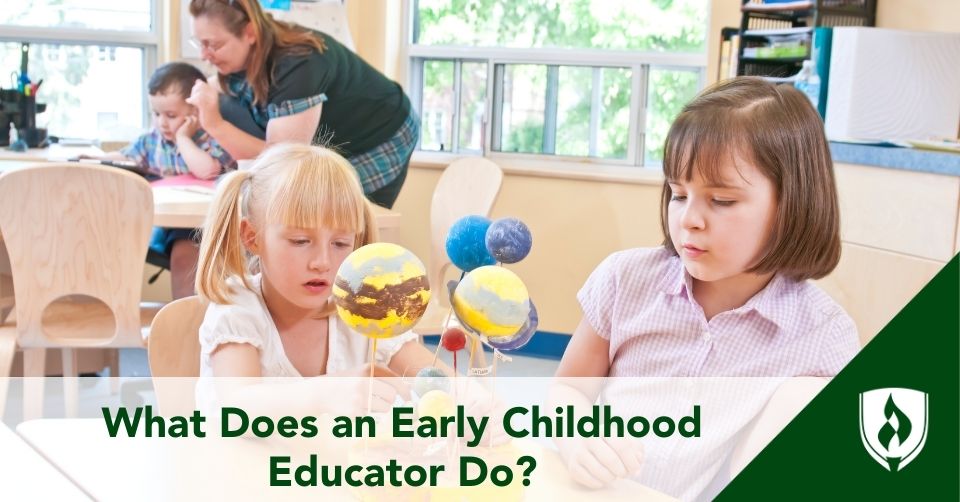What Does an Early Childhood Educator Do?
04/10/2025

Through early childhood education (ECE), children receive a foundational education that helps them grow and develop at a healthy pace at settings like daycare, preschool, and kindergarten.
If you're passionate about working with young children and making a lasting impact, a career in early childhood education may align with your goals and interests. But what exactly does an early childhood educator do, and how can you prepare for this rewarding career? Read on to learn more.
Roles and Responsibilities of an Early Childhood Educator
As an early childhood educator1, you will help young children develop essential skills that will serve as the building blocks for their future. Your work will involve more than just teaching academic content, it's about guiding children through social, emotional, and cognitive development.
These skills may include:
- Language development: Encouraging vocabulary growth, comprehension, and communication.
- Basic math: Introducing early math concepts, such as counting and simple addition.
- Motor skills: Promoting physical development through fine and gross motor activities.
- Socialization: Helping children develop crucial social skills, like sharing, cooperating, and making friends.
The responsibilities of an early childhood educator can vary depending on the setting, but the key tasks generally include:
- Developing lesson plans: Tailoring lessons to each child's age and developmental needs.
- Creating an engaging learning environment: Designing a classroom that encourages play, exploration, and hands-on learning.
- Promoting social, emotional, and cognitive skills: Using activities and interactions to help children grow in these key areas.
- Managing the classroom: Keeping things organized and ensuring that children are engaged and safe.
- Communicating with parents: Keeping families informed about their child's progress, challenges, and milestones.
In this role, you'll need to be creative, organized, and patient. Each day will bring new challenges and opportunities, but the reward is helping children build a solid foundation for their educational journey.
Key Skills and Qualities of a Preschool Teacher
As an early childhood educator, certain qualities and skills are especially important for preschool teachers2. The following are some common traits:
- Patience: Children, especially at young ages, can be unpredictable and full of energy. Patience is crucial for managing the dynamics of a classroom and ensuring that each child is supported in their development.
- Creativity: Planning engaging and enjoyable activities is a big part of teaching young children. Creativity helps teachers keep kids interested and motivated.
- Organization: Early childhood educators need to keep their classrooms organized, maintain schedules, and plan lessons.
- Communication Skills: Teachers must communicate effectively with children, parents, and other members of the school staff. Clear communication ensures that everyone is on the same page with regard to a child's progress and needs.
- Compassion: Since young children are still developing social and emotional skills, a compassionate approach can help build trust and make kids feel safe and cared for.
Curriculum Planning and Implementation
A major part of an early childhood educator's role is planning lessons and activities that align with developmental milestones. Educators work to design a curriculum3 that fosters growth in areas such as:
- Language development
- Basic math and literacy skills
- Social skills (sharing, taking turns, etc.)
- Emotional regulation and self-awareness
Educators must be both creative and organized when planning a curriculum that meets children's developmental needs. This involves choosing appropriate materials and teaching strategies, as well as adapting plans based on how children are responding to the activities.
Four critical elements4 of planning a curriculum may include:
- Aim or objective: What are you hoping to achieve?
- Content or subject matter: Do you follow a suggested curriculum to a "T" or include other insights?
- Methods or procedures: What are some teaching methods to help you achieve your goals?
- Assessment or evaluation: How do you know you've reached your goal?
Classroom Management and Organization
Creating an effective classroom environment is essential in early childhood education. Teachers must manage the classroom by keeping children engaged, setting clear rules and routines, and maintaining a safe environment. Early childhood educators often introduce daily schedules to give children a sense of security and consistency.
Teachers need to:
- Plan ahead to ensure activities are age-appropriate and engaging.
- Prepare materials to support the learning process.
- Maintain order through established routines and positive reinforcement.
Classroom management isn't just about discipline, it's also about creating a learning space where kids feel comfortable and excited to participate.
Working With Families and Communities
Early childhood educators work closely with parents and other community members to support children's development. This includes regular communication with parents about their child's progress, challenges, and achievements.
Educators may also consult with other professionals, such as child psychologists or speech therapists, to address any developmental concerns.
Collaborating with other educators and community members helps ensure that children receive the support they need, both inside and outside the classroom.
Challenges and Opportunities
An exploratory study by Vuorinen5 explored collaboration between parents and early childhood educators that discussed challenges and opportunities.
While parents expressed general satisfaction with communication and felt acknowledged, they identified areas for improvement, such as receiving more information about their child's learning. Despite educators' confidence in their ability to share information, parents often felt disconnected, revealing organizational barriers like limited communication time and rotating staff.
The study also found that educators felt less confident when working with culturally diverse families and dealing with concerns.
A strong need for further professional development was noted, with educators seeking practical training in areas such as cross-cultural communication, addressing parental concerns, and managing challenging behaviors.
The conclusion? The study emphasized the importance of ongoing training for ECE professionals and system support to improve collaboration between parents and educators.
Career Paths and Specializations for Early Childhood Educators
In addition to working in traditional education settings2, early childhood educators can also pursue roles in child development programs, child daycare services, or educational services.
The field of early childhood education offers numerous career paths. As an early childhood educator, you can work in a variety of settings, such as:
- Daycare Centers
- Preschools
- Kindergarten and Early Elementary Grades
Some educators specialize in areas like special education, focusing on children with disabilities or learning challenges. Others might pursue careers in child development programs, child daycare services, or educational consulting.
If you're looking to make a difference in the lives of children, there are many opportunities to build a career in early childhood education.
Education and Training Requirements
To become an early childhood educator, you'll need the right training and education. The educational requirements to become an early childhood educator or preschool teacher can vary based on the specific role and the setting. For entry-level positions, such as working in a daycare center, a high school diploma is typically the minimum requirement, though a background check is also usually required.
Many educators pursue further education, such as:
- An ECE certificate
- An associate degree in early childhood education
- A bachelor's degree in early childhood education
Each role in early childhood education may have different certification and educational requirements, depending on the setting and responsibilities.
Ready To Make a Difference?
Early childhood education is a vital part of a child's development, providing a foundation for lifelong learning and social success. Early childhood educators work to support children's growth by creating a safe and stimulating environment where they can learn essential skills, such as language development, social interaction, and emotional regulation.
If you are interested in working with young children and helping them develop the skills they need for the future, consider investigating how your interests and goals align with a path to early childhood education in How To Become an Early Childhood Educator. The skills you bring to the classroom — such as organization, communication, and a love for teaching — will play a crucial role in shaping the next generation of learners.
1U.S. Department of Health and Human Services, Administration for Children and Families, "Children's Learning and Development: Benefits of High-Quality Early Care and Education," at https://acf.gov/opre/report/childrens-learning-and-development-benefits-high-quality-early-care-and-education (visited Mar. 10, 2025).
2U.S. Bureau of Labor Statistics, "Preschool Teachers," at https://www.bls.gov/ooh/education-training-and-library/preschool-teachers.htm#tab-2 (visited Mar. 10, 2025).
3Fleer, Marilyn, and Lissanna F. S. O'Neill, Early Childhood Curriculum, at https://www.google.com/books/edition/Early_Childhood_Curriculum/krpQDwAAQBAJ?hl=en&gbpv=1&dq=curriculum%20planning%20for%20early%20childhood%20education&pg=PA4&printsec=frontcover (visited Mar. 10, 2025).
4Fleer, Marilyn, and Lissanna F. S. O'Neill, Early Childhood Curriculum, at https://www.google.com/books/edition/Early_Childhood_Curriculum/krpQDwAAQBAJ?hl=en&gbpv=1&dq=curriculum%20planning%20for%20early%20childhood%20education&pg=PA10&printsec=frontcover (visited Mar. 10, 2025).
5Vuorinen, T., "Research on Collaboration in Early Childhood Education Services: Parents' Views," SAGE Journals, at https://journals.sagepub.com/doi/full/10.1177/1836939120979067 (visited Mar. 10, 2025).



